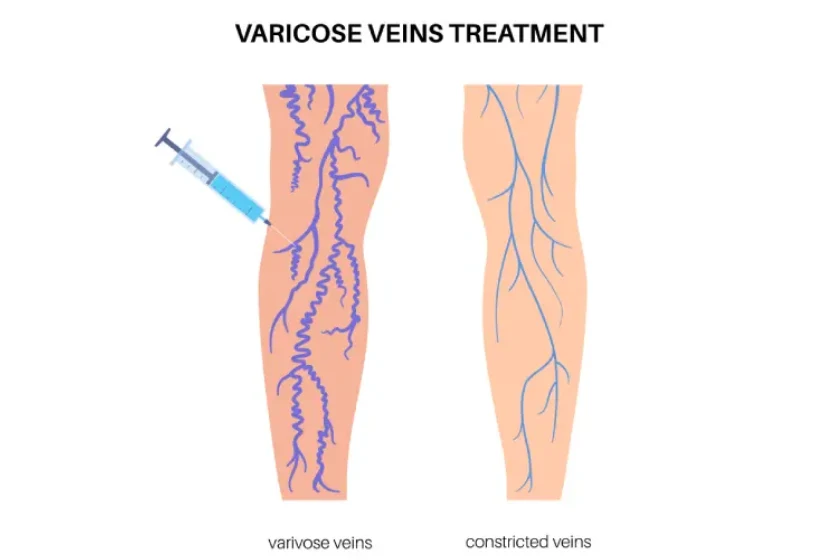
Best Time of Year to Treat Varicose Veins: What Doctors Recommend
Why Timing Matters in Varicose Vein Treatment
Is there a perfect time to treat varicose veins?
From a medical standpoint, the best time to get treated is as soon as the problem appears. Varicose veins are progressive, and delaying treatment can result in complications like skin darkening, hardening, itching, leg cramps, or even ulcers.
Whether your veins are visibly enlarged or causing leg heaviness and pain, early diagnosis by a vascular expert is crucial.
However, varicose vein treatment is not an instant fix. It is a long-term process that involves procedures, follow-up care, compression stockings, and ongoing management of vein health.
That is why many patients ask, “When will I be most comfortable during this journey?” The answer lies in understanding how the weather, recovery routines, and personal comfort influence your experience, especially here in India, where climate change is significant.
Best Time to Treat Varicose Veins: Autumn and Winter
For most patients, the ideal time for varicose vein treatment is during autumn and winter, from October to February. Cooler weather offers several practical advantages that improve both the procedure experience and recovery process.
Wearing compression stockings after treatment is mandatory for most patients. These stockings improve circulation and support healing, but can feel hot and uncomfortable during the summer. In the cooler months, however, patients find it easier to wear them consistently.
Cold weather naturally reduces inflammation and vein dilation. This means there is less discomfort, swelling, and heaviness in the legs. Healing is faster, and daily activities feel less restrictive. Patients also tend to stay indoors more during winter, which allows for better rest and post-procedure care.
Another advantage is planning. If you treat your veins during winter, you will be ready to move freely and confidently by summer, whether you are traveling or attending events. So while there is no wrong time to treat varicose veins, autumn and winter offer the most comfort.
Can You Treat Varicose Veins in Summer or Monsoon?
Yes, you absolutely can. Many people require or prefer treatment during the monsoon or summer months due to their schedules. While warmer weather does not reduce the effectiveness of treatment, it may affect comfort levels, especially when it comes to wearing compression garments.
Humidity can worsen the sensation of heaviness and cause increased sweating inside compression stockings. There may also be more chances of itching or rashes on the skin. However, with the right precautions — staying hydrated, resting well, wearing breathable fabrics — treatment can still be carried out safely and successfully.
In fact, some patients choose summer intentionally because they can combine the healing period with school holidays or work-from-home schedules. The key is to work closely with your vein specialist doctor in Vadodara, who will tailor your treatment plan according to your symptoms, lifestyle, and recovery needs.
Common Varicose Vein Treatment Options
Varicose vein treatment has come a long way. Today’s methods are minimally invasive, highly effective, and require little to no hospital stay. As a varicose vein specialist in Vadodara, I offer patients a range of modern options depending on the severity and type of vein issue.
Endovenous Laser Ablation
This is one of the most popular treatments. A laser fiber is inserted into the vein, and heat is used to close the damaged vein.
Radiofrequency Ablation
Similar to laser therapy, but uses radio waves to seal off problematic veins.
Foam Sclerotherapy
Sclerotherapy is a special solution that is injected into the vein, causing it to shrink and eventually disappear.
Venaseal Closure
This is a glue-based treatment that closes the vein without heat.
Hook Phlebectomy
A small incision is made, and the vein is removed through a minimally invasive procedure.
Most of these treatments are done as outpatient procedures or admission with one day of stay. Recovery is quick, but follow-up care and lifestyle changes are essential for long-term results.
Choosing the Right Time and the Right Doctor
While weather and comfort can influence your timing, choosing the right doctor is the most important decision. A good vascular surgeon will evaluate your symptoms, investigate the root cause with the right tests, and guide you on whether to treat now or wait.
Avoid temporary solutions like creams or over-the-counter painkillers. These only mask symptoms and do not address the vein damage. A specialist will not only recommend the best time but also the best treatment, based on your unique condition.
Why Choose a Local Vein Specialist in Vadodara?
If you are based in Gujarat, choosing a vein specialist doctor in Vadodara has several advantages. As someone who treats a high number of vascular patients, I understand local challenges — from climate-related symptoms to patient schedules around festivals or seasonal routines.
Being close to home also makes follow-ups easier. Varicose vein care does not end with one procedure. Follow-up visits, ultrasound checks, and lifestyle guidance are key to preventing recurrence. Having a trusted varicose vein specialist in Vadodara ensures continuity of care and convenience.
I also offer specialized care plans for working professionals, senior citizens, and those with diabetes or previous vein treatments. Each patient receives a personalized solution that fits their life and goals.
Conclusion
There is no bad time to treat varicose veins. The moment you notice symptoms — heaviness, swelling, visible veins, skin darkening, or discomfort — it is the right time to get evaluated. Delaying only increases the risk of complications.
However, if you are planning ahead and looking for comfort during your recovery, the best time to treat varicose veins is during autumn and winter. Cooler weather makes the healing process more pleasant, especially when it comes to wearing compression stockings and managing swelling.
Whether you choose winter or summer, make sure you choose the best varicose vein doctor for a safe, effective, and personalized experience. Your veins deserve expert care, and your legs deserve long-term relief.
Frequently Asked Questions
While you can treat varicose veins at any time, autumn and winter are preferred due to better comfort during recovery. Cooler weather helps reduce swelling and makes it easier to wear compression stockings.
Cool and dry climates are ideal. Heat can dilate veins, making symptoms worse. Winter and early spring are generally more comfortable for recovery.
Yes. Symptoms like heaviness and swelling often reduce in winter due to better circulation and lower temperatures. Winter also helps in faster post-treatment healing.
Endovenous laser therapy, radiofrequency ablation, and Venaseal closure are among the most advanced and effective treatments today. These are minimally invasive, safe, and offer faster recovery.

Dr. Sumit Kapadia
MBBS, MS, MRCS, DNB-Fellow



